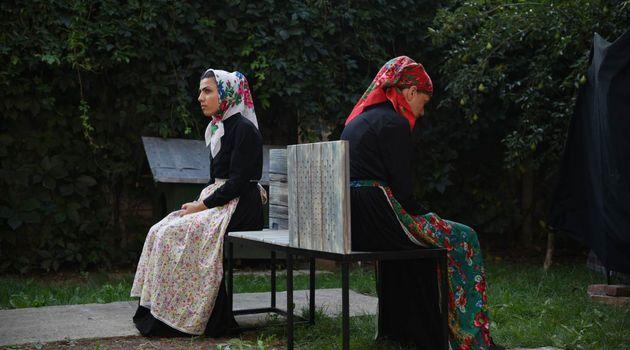Feminist Roma theater company celebrates the abolition of Roma slavery in Romania

February 20th marks the liberation of the Roma population from slavery in Romania. For 500 years, most of the Roma in Romania were enslaved by Orthodox Monasteries and the boyars, who were the Romanian aristocracy. In commemoration of this event the feminist Roma theater company, Giuvlipen, presented Cine a omorât-o pe Szomna Grancsa? (Who killed Szomna Grancsa?) on February 23rd in Bucharest as a reminder that racism against the Romani people continues to persist.
The word “Giuvlipen” is a hybrid of the Romanes word for woman (“giuvli”) and “ipen”, which means crowd. There is no word for feminism in the language, so the group has created this word. Mihaela Dragan, a Giuvlipen actress and graduate in Romanes language studies, told Dazed, an American independent fashion and culture magazine, that there are plans to add the word “giuvlipen” to the Romanes-language dictionary in Romania.
As revolutionaries against racism and sexism, Giuvlipen use art to voice their disgust with the way Roma women are treated internationally. Their mission is to empower women within their community to resist discrimination.
In July, Giuvlipen actress Zita Moldovan told Dazed, “I don’t promote the traditional Roma woman. I promote the woman in general.” Through theater they bring Romani women’s issues to light in order to foster a new consciousness and bring about change for all women.
Who killed Szomna Grancsa? was originally premiered on February 23, 2017 for the same occasion and was met with success. Cristina Nedelcu of the Romanian news site Juranlul de Ilfov described it as “a special, unique and exciting event.”
Inspired by the true story of the suicide of a young Romani girl, Szomna Grancsa, the piece is a critique of traditional gender roles within Roma culture. An inspiration to many in her village, Grancsa defied her traditional role as a young woman by wearing jeans and asking to be enrolled in school.
Her parents eventually did not let her remain in school because they wanted her to get married and fulfill her traditional responsibilities as a Romani woman. Grancsa hung herself at the age of 17, writing on a wall in her home, “The school is me.”
According to Eurostat, the dropout rate of Romanian school children in 2017 was 18.3%, compared to 10.6% in the entire EU. Early school leaving affects all Romanians and is not just a social issue but an economic one that affects male and female students equally.
In the fall Giuvlipen toured Romania with a declaration called “Roma Theater is not Nomadic” advocating for a state-funded Roma theater.
In 2017 the group presented a cabaret show, Gadjo Dildo, a commentary on the hypersexualization that Roma women are subjected to by non-Roma men. The piece features a lesbian character who dates men to hide her true identity. Previous Giuvlipen productions have brought to light issues within the LGBTQ+ community, as well as issues of forced early marriage, racist hate speech, and forced evictions of the Roma in Bucharest.
The theater collective represents a hope for equality that extends beyond just young Romani women.
